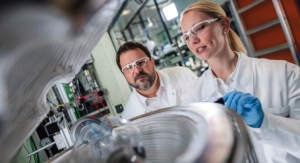09.06.17
To reduce its dependency on fossil raw materials, Covestro said it is looking to manufacture a growing number of products and their associated precursors from renewable raw materials.
Covestro said it will be working with four partners – Sortimo International GmbH, the German Institutes of Textile and Fiber Research Denkendorf (DITF), the Institut für Kunststofftechnik (Institute for Plastics Engineering, IKT) at the University of Stuttgart and the Fraunhofer Institute for Chemical Technology (ICT) – "to develop bio-based reinforcing layers for solid wood construction materials to replace the petrochemical products used to date."
The polyurethane system, which is reinforced with cellulose fibers, will be more than 90 percent bio-based, contain zero additives and exhibit excellent flame retardance and weathering resistance, according to Dr. Frank Rothbarth, External Communications/Trade Press.
The German Federal Ministry of Food and Agriculture (BMEL), through sponsor Fachagentur Nachwachsende Rohstoffe e.V. (Agency for Renewable Resources, FNR), is supporting the project, per Rothbarth.
Over the course of the recently launched project, the researchers want to find bio-based alternatives to the fossil-based resins and fibers that have been used to date, Rothbarth said.
They are pursuing a combination of biogenous, aliphatic polyisocyanates and polyols based on vegetable oils, he said.
The resultant polyurethanes should exhibit low flammability and good weathering resistance, so that no special additives are needed to enhance either property, Rothbarth added.
“At the end of this process, we will have the first ever reinforcing materials for use in timber construction that are made up of at least 90 percent renewable raw materials,” said Covestro's Dr. Paul Heinz, who is coordinating the research project.
According to Rothbarth, when it comes to manufacturing the construction elements, the project partners have opted for pultrusion, a continuous industrial production process for highly filled, continuous fiber-reinforced composite profiles.
Pilot facilities run by the Fraunhofer Institute are being used to manufacture flat profiles for testing and optimizing the necessary tools and process parameters, according to Rothbarth.
During the project, Sortimo will produce an industry-standard model component that will then be used to evaluate the technical, economic and ecological potential of the new material and production process for the construction industry, Rothbarth said.
Information is available in the Projektförderung menu at www.fnr.de, the website of the project sponsor, under the following FKZ project ID numbers:
• 22022616 – Coordination, Modification of the Bio-Based Polymer Matrix
Covestro Deutschland AG
• 22003517 – Implementation of Development Work in an Industrial Demonstration Plant
Sortimo International GmbH
• 22003617 – Investigations into the Use of Bio-Based Reinforcing Fibers
German Institutes of Textile and Fiber Research Denkendorf (DITF)
• 22003717 – Process Development for the Production of Reinforcing Segments
University of Stuttgart, Institut für Kunststofftechnik (IKT)
• 22003817 – Running the Pilot Pultrusion Plant and Process Evaluation
Fraunhofer Institute for Chemical Technology (ICT)
Photo courtesy Covestro.com
Covestro said it will be working with four partners – Sortimo International GmbH, the German Institutes of Textile and Fiber Research Denkendorf (DITF), the Institut für Kunststofftechnik (Institute for Plastics Engineering, IKT) at the University of Stuttgart and the Fraunhofer Institute for Chemical Technology (ICT) – "to develop bio-based reinforcing layers for solid wood construction materials to replace the petrochemical products used to date."
The polyurethane system, which is reinforced with cellulose fibers, will be more than 90 percent bio-based, contain zero additives and exhibit excellent flame retardance and weathering resistance, according to Dr. Frank Rothbarth, External Communications/Trade Press.
The German Federal Ministry of Food and Agriculture (BMEL), through sponsor Fachagentur Nachwachsende Rohstoffe e.V. (Agency for Renewable Resources, FNR), is supporting the project, per Rothbarth.
Over the course of the recently launched project, the researchers want to find bio-based alternatives to the fossil-based resins and fibers that have been used to date, Rothbarth said.
They are pursuing a combination of biogenous, aliphatic polyisocyanates and polyols based on vegetable oils, he said.
The resultant polyurethanes should exhibit low flammability and good weathering resistance, so that no special additives are needed to enhance either property, Rothbarth added.
“At the end of this process, we will have the first ever reinforcing materials for use in timber construction that are made up of at least 90 percent renewable raw materials,” said Covestro's Dr. Paul Heinz, who is coordinating the research project.
According to Rothbarth, when it comes to manufacturing the construction elements, the project partners have opted for pultrusion, a continuous industrial production process for highly filled, continuous fiber-reinforced composite profiles.
Pilot facilities run by the Fraunhofer Institute are being used to manufacture flat profiles for testing and optimizing the necessary tools and process parameters, according to Rothbarth.
During the project, Sortimo will produce an industry-standard model component that will then be used to evaluate the technical, economic and ecological potential of the new material and production process for the construction industry, Rothbarth said.
Information is available in the Projektförderung menu at www.fnr.de, the website of the project sponsor, under the following FKZ project ID numbers:
• 22022616 – Coordination, Modification of the Bio-Based Polymer Matrix
Covestro Deutschland AG
• 22003517 – Implementation of Development Work in an Industrial Demonstration Plant
Sortimo International GmbH
• 22003617 – Investigations into the Use of Bio-Based Reinforcing Fibers
German Institutes of Textile and Fiber Research Denkendorf (DITF)
• 22003717 – Process Development for the Production of Reinforcing Segments
University of Stuttgart, Institut für Kunststofftechnik (IKT)
• 22003817 – Running the Pilot Pultrusion Plant and Process Evaluation
Fraunhofer Institute for Chemical Technology (ICT)
Photo courtesy Covestro.com













